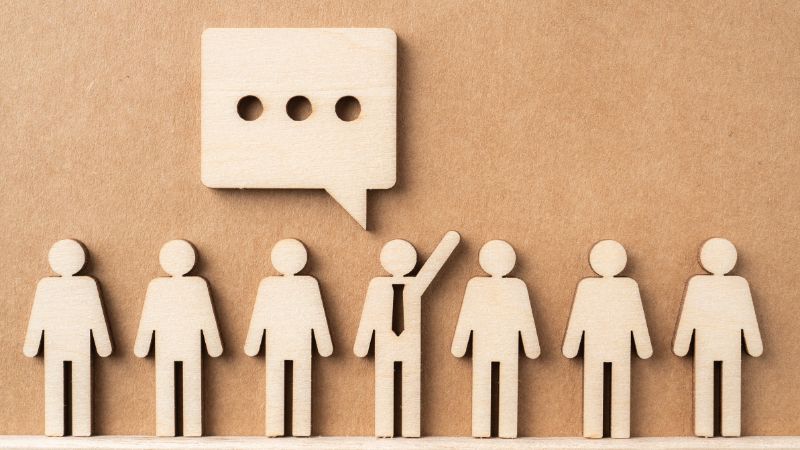Interpersonal communication is a dance of words and emotions. Simply put, it’s the exchange of messages, feelings, and information between two or more people. It’s not just about talking; it’s about listening, understanding, and responding. It’s a two-way street.
Unlike mass communication, which broadcasts messages to large groups, or intrapersonal communication, which is the dialogue we have with ourselves, interpersonal communication is more intimate.
It’s the daily meetings with your colleague, the heartfelt conversations with a friend, or the constructive feedback from your boss.
It’s the fabric that weaves our social connections, helping us build relationships, solve problems, and work together.
Mastering this dance is not just beneficial—it’s essential.
Why Interpersonal Communication Works
Interpersonal communication is how we share information, feelings, and meaning through verbal and non-verbal messages. It’s a key part of our daily interactions, helping us connect and understand each other better.
It works by combining words with tone, body language, and facial expressions. Good communication involves active listening, empathy, and feedback to make sure the message is clear. This back-and-forth helps prevent misunderstandings and builds stronger connections.
Research shows its importance: Harvard Business Review highlights its role in effective leadership, while studies link good communication to better teamwork and job satisfaction.
Strong interpersonal skills also help resolve conflicts and build trust. Companies with good communication practices see fewer conflicts and more engaged employees.
To dive deeper, check out the 10 reasons why interpersonal communication is important.
1. Building Stronger Relationships
Interpersonal communication helps us express our feelings, desires, ideas, and expectations. It also aids in understanding the sentiments and thoughts of others.
As we refine our interpersonal skills, misunderstandings reduce, trust amplifies, and bonds deepen.
Consider Maria and Liza, two colleagues who often worked late.
Maria always felt Liza was burdening her with work until one day, they sat down and talked. Liza shared that she felt overwhelmed with her workload and was only trying to do her best. Maria, understanding Liza's perspective, suggested they discuss task delegation with their manager. This conversation not only prevented a potential rift but also paved the way for a more collaborative work environment.
Read: How Interpersonal Communication Build Stronger Relationships

2. Facilitating Teamwork and Collaboration
Teamwork is the backbone of success. Effective interpersonal communication is the lifeblood that ensures this backbone is robust and resilient.
When team members can openly share ideas, give constructive feedback, and voice concerns without fear, they foster an environment ripe for innovation and effective collaboration.
Take the case of a government department tasked with organizing a large-scale community event. Initially, members from different divisions found it hard to synchronize due to clashing opinions. However, once they decided to hold regular communication sessions, ensuring every voice was heard and every concern addressed, they began to work seamlessly. The event turned out to be a grand success, all thanks to their renewed commitment to open and transparent communication.
3. Effective Problem Solving
Problems, misunderstandings, and conflicts are inevitable in both personal and professional spheres. What distinguishes successful resolution from prolonged disputes is often the quality of interpersonal communication.
Open dialogues, active listening, and the willingness to understand other perspectives are critical in addressing and resolving issues efficiently.
In a city government office, two teams were at loggerheads over the allocation of resources for their respective projects. Instead of escalating the conflict, their manager initiated a mediation session. Through open dialogue and understanding each other's priorities and constraints, the teams found a middle ground, ensuring the success of both projects.
4. Boosting Leadership Skills
Leadership isn’t just about making decisions; it’s about inspiring, guiding, and being a beacon for one’s team. At the heart of effective leadership lies interpersonal communication.
Leaders who articulate their vision clearly, actively listen to their team members, and respond empathetically are more likely to inspire loyalty, dedication, and exceptional performance.
Director Reyes took charge of a demotivated government department, facing significant public criticism. Instead of resorting to authoritative measures, he organized townhall meetings, clearly communicated his vision for the department's turnaround, and actively sought feedback. His clear communication and genuine openness to dialogue reinvigorated the team's spirit. Under his leadership, the department not only met its targets but also regained public trust.
5. Enhancing Job Performance
Effective interpersonal communication goes beyond just speaking. It involves active listening, understanding, and feedback, all of which are crucial for executing tasks and meeting job expectations.
Those who communicate well tend to be more efficient in their roles and adapt better to changing job requirements.
Maria, a government employee in the health department, was given the task of coordinating a large-scale vaccination drive. Her role required liaising with multiple agencies, understanding logistical challenges, and ensuring timely execution. Because of her strong communication skills, she could effectively gather the necessary information, address concerns, and mobilize teams, leading to the successful implementation of the drive.
6. Fostering Cultural Sensitivity
Government employees interact with individuals from varied cultural backgrounds. Interpersonal communication skills help in understanding these cultural nuances and ensuring that communication is respectful and effective, bridging potential divides.
When the local government of Davao decided to launch an initiative targeting the indigenous communities, Roberto, an outreach officer, took the lead. Understanding the significance of cultural sensitivity, he engaged in dialogue with community leaders, learned about their traditions and values, and ensured that the program's communication was tailored to resonate with them. This approach led to higher community participation and trust.
7. Building Trust and Credibility
Trust is the foundation of any strong relationship. Effective interpersonal communication promotes transparency, consistency, and authenticity, all of which are essential in establishing trust. Especially in the public sector, where trust is paramount, having strong communication skills can greatly enhance credibility.
During a crisis where public funds were misappropriated, Commissioner Lina took a proactive approach. She held press conferences, openly communicated the steps being taken to address the issue, and ensured regular updates to the public. Her honest and transparent communication approach restored public faith in the department, showcasing the power of effective interpersonal communication.
8. Reducing Misunderstandings and Conflicts
Conflicts and misunderstandings, if left unaddressed, can derail projects, damage relationships, and create a toxic work environment.
Good interpersonal communication helps in clarifying intentions, resolving ambiguities, and ensuring that everyone is on the same page.
At a regional government office, two department heads, Rosa and Marco, found themselves at odds over resource allocation. Instead of letting the issue escalate, they decided to have an open dialogue. By clearly communicating their needs, constraints, and priorities, they quickly realized that a mutual solution was achievable. The result was a compromise that benefited both departments, all thanks to effective communication.
9. Enhancing Personal Growth and Learning
Interpersonal communication is not just about talking—it’s also about listening and understanding. Engaging in meaningful conversations can provide insights, broaden perspectives, and facilitate personal growth.
Moreover, feedback received through such interactions can be instrumental in self-improvement.
Elena, a young government official, often sought feedback from her colleagues and subordinates. One consistent observation was her tendency to rush decisions. By actively listening and reflecting on this feedback, Elena took steps to become more deliberative in her decision-making, ultimately becoming a more effective leader.
10. Promoting Employee Engagement and Satisfaction
Employees who feel heard and understood are more likely to be engaged in their work. Effective interpersonal communication fosters a sense of belonging, recognition, and validation, leading to higher job satisfaction and reduced turnover.
The Department of Tourism initiated a monthly "Town Hall" meeting where employees at all levels could openly communicate their ideas, concerns, and feedback. This platform, rooted in open communication, not only led to innovative ideas but also improved employee morale, as they felt valued and integral to the department's mission.
The Essence of Interpersonal Communication
Technical proficiency alone doesn’t guarantee success.
The story of our Filipino professional underscores a truth many often overlook: the vital role of interpersonal communication in our daily interactions. Whether it’s forging stronger bonds, solving problems, or leading a team to victory, effective communication sits at the heart of these accomplishments.
For government employees, the implications are even more profound. Serving the public isn’t just about policies and procedures—it’s about understanding, empathy, and connection.
By mastering interpersonal communication, one can truly harness the power of collaboration, ensuring that the wheels of progress move smoothly and efficiently.
To our readers, if the self-assessment quiz hints at areas for improvement, remember it’s never too late to refine your communication skills.
As we grow in our careers and personal lives, let’s ensure our ability to connect and communicate grows with us. After all, in a world full of noise, being understood is a gift—one worth cultivating.







